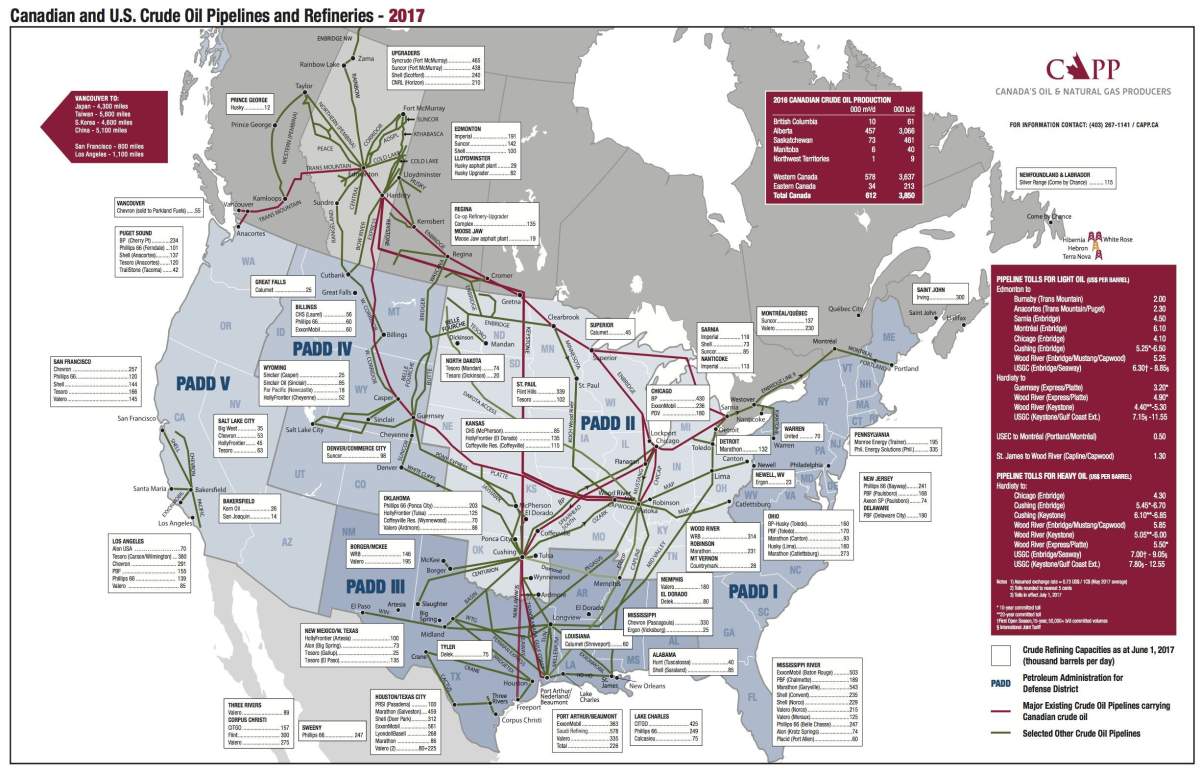Canada’s oil and gas producers are struggling to stay competitive with their U.S. counterparts because of the struggle to expand pipeline capacity, says a new report from the C.D. Howe Institute.

The analysis by associate director of research Benjamin Dachis is the first in what he says will become an annual comparison of Canada’s oil and gas sector with its North American equivalents.
The report comes just days before the federal government is expected to unveil how it plans to overhaul the environmental and regulatory review process for major energy projects.
READ MORE: Oilsands output set to surpass export pipeline room
Industry expects that overhaul to be the make-or-break plan for future pipeline projects, and Dachis says the lack of pipelines to transport oil and gas to market remains the biggest factor affecting the industry’s competitiveness with the U.S.
“If Canadian governments allowed pipelines to be built expeditiously, the competitiveness of western Canadian oil producers would be greatly improved,” he wrote.
While carbon taxes are getting the lion’s share of political and public attention, they’re having little negative effect, Dachis said – and indeed, if they are well-designed, can actually create an incentive to cut emissions without affecting competitiveness.
A lack of pipeline capacity for getting product to market, on the other hand, has a significant impact, Dachis said, with estimates that the bottleneck cuts about $5 off the profits of every barrel of oil produced in an average western Canadian well.
The analysis looks only at conventional oil and gas wells and not the oilsands, the economics of which are far different and don’t compare to conventional oil wells in the U.S., he said.
“This is where a lot of emerging oil and gas investment is going,” said Dachis. “It’s where the magic is happening.”

Get weekly money news
READ MORE: Canadian drillers moving oil rigs south to chase better prospects in Texas
Canada has watched several pipeline projects evaporate in the last year, including TransCanada’s Energy East pipeline between Alberta and the east coast, the Mackenzie Valley gas pipeline from the Beaufort Sea, and the Northwest LNG project in B.C.
- Bank of Canada holds rates, says policy can’t make up for tariff ‘damage’
- Pizza Pops contaminated with E. coli tied to 7 hospitalizations, data shows
- Canada deal on Chinese EVs shows trade ‘trumped national security’: experts
- Canada could increase real GDP by 7% if it drops all internal trade barriers: IMF
Proponents in all three cases cited regulatory holdups as one of the reasons for the demise of the projects, although regulation was only one factor.
“The regulatory process sure didn’t help, but at the end of the day, market forces probably made the decision,” Dachis said.
READ MORE: Alberta Energy Regulator to ask tougher questions of oil well applicants
The plummeting price of natural gas made new pipelines less economical. In the case of Energy East, the arguments for it became less forceful when the U.S. revived the once-moribund Keystone XL pipeline.
Dachis said Keystone, the Trans Mountain expansion between Alberta and B.C. and the Enbridge Line 3 replacement comprise a lot of new capacity that would make the argument for Energy East tougher to make.
Trans Mountain’s expansion, which would triple the capacity of the oil pipeline, is in question again after the B.C. government proposed new limits on shipments of bitumen through the province.
The regulations could block the expansion altogether. The B.C. government opposes it, but Alberta Premier Rachel Notley has said she will sue B.C. over the regulations. Notley said B.C. is overstepping its authority and that the regulation will hurt the Canadian economy.
Saskatchewan’s incoming premier Scott Moe sided with Notley as well.
“The B.C. NDP are playing politics at the risk of thousands of Canadian jobs, future infrastructure projects as well as investor confidence in our energy industry,” he said in a statement.
WATCH: B.C. is looking to limit bitumen flowing across its border and Alberta says that simply won’t stand. Tom Vernon has more on the battle heating up between the two provinces over the Trans Mountain pipeline.

Federal Natural Resources Minister Jim Carr restated his government’s support for the project earlier this week. The Liberal government approved the project in 2016.
READ MORE: Trans Mountain opponents can’t hold Alberta economy hostage, Rachel Notley says
The federal Liberals have spent the last two years consulting on how to overhaul the regulatory and environmental reviews for major energy projects, arguing the process needed to be more transparent and more fair.
Legislation is anticipated next week on the matter.








Comments